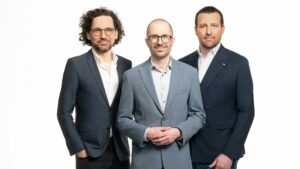The North Star Metric And The Value Proposition Of The First Complete Product Management Training Program In Bulgaria

Product managers have one of the most interesting and at the same time valuable roles in the software sector. It’s their job to understand customer needs and craft differentiating value propositions, to uncover new product opportunities and prioritize what needs to be built, and last but not least, to effectively communicate the product roadmap to engineers, UX designers, marketers, and other internal stakeholders.
Yet, there are not that many product managers that can be found in Bulgaria today, and the options for learning the necessary skills and mindset have been even fewer. And, that’s talent needed not only by the more and more international product companies with offices in the country, but also by the next local entrepreneurs looking to create a successful new venture from scratch.
So, last week, Telerik Academy announced an intention to fill in this gap with probably one of the most complete product management training courses created to date in the region. Developed in collaboration with a number of product-oriented software organizations, the 3-month program starts on September 8th and is already accepting applications.
“We focused on the role of the product manager because the industry is in dire need of such talent, which is key to its future development. This also came as feedback in a constant dialogue with our partner network (over 85 IT companies) and the majority of BASSCOM members. Also, people’s interest in the profession is very high. One week after the announcement of the program, the number of applications exceeds our expectations. Nearly 40 people applied just in the first 24 hours of its opening,” shares Alexandra Mechkova, CEO at Telerik Academy.
The North Star Metric
As defined by Sean Ellis, a north-star metric is ‘the single metric that best captures the core value that your product delivers to customers’. According to Amplitude, the product’s north star serves three important purposes – give clarity and alignment within the organization, communicate impact and progress, and hold a product accountable to an outcome.
“In my opinion, the ideal success metric for this program would be the number of senior product management positions in Bulgaria in 5 years. In the longer term, we could also look at the successful development of more local product companies,” tells Trending Topics Mariya Rashkovska, lead trainer at Telerik Academy’s Product Management course and co-founder at the Bulgarian chapter of ProductTank.
Rashkovska has over 15 years of experience in the Bulgarian IT industry. After managing products for companies like Telerik, Progress, and The Financial Times, lately she’s been teaching lean product management to tech companies that want to go from an idea to product-market fit. The rest of teaching team includes familiar names from the ecosystem such as Svetozar Georgiev, co-founder of Telerik, Ivailo Ivanov, Director of Product Management at Leanplum, Hristo Borisov, Co-founder & CEO at Payhawk and a number of other experienced product managers from companies like Coursera, Progress, Skyscanner, and Uber.
The Student Journey And The Value Proposition
We asked Rashkovska what will be the most important things about product management she will try to teach to students.
“I will try to teach students to think like CEOs, even though they will not formally have that power. When you think like a CEO, you find the right balance between how to create value for customers on the one hand, and stability for the business, on the other. The second most important thing will be the lean principles, which allow you to minimize business risk by validating the most critical points of the business plan with minimal resources,” commented Rashkovska.
Overall, the goal for the program is to cover the management of the entire product lifecycle – from idea to revenue generation. Participants will cover a broad range of topics: from customer research, market sizing, competitor analysis and value propositions through financials and communication with different stakeholders to prioritization techniques and the usage of analytics and key metrics to drive product direction and ultimately product-market fit.
The curriculum has been designed for two main groups of people – junior product managers who want to take the next step in their development or people with at least one year of experience in project management, business analysis, marketing, or software engineering who are looking to change careers. On the B2B level, another target group is that of software companies that want to invest in the further advancement of their employees.
In order to join, potential students need to submit a CV, give answers to a few questions and complete an online test covering the fundamentals of product management. Before the 9th of August.
The Differentiation And The Pricing
Given that the course may move online depending on the COVID-19 situation, we were curious what are the advantages of the program provided by Telerik Academy over the already established digital courses on the market (e.g. Udacity or Product School).
“Many of these courses are easily accessible but do not go deep enough and address topics at a more general level. Practical exercises are almost absent or are at a very basic level, not to mention that there is no feedback to the student about how he coped with the specific task. Lastly, it is difficult for students to choose the right course, because there is still no single standard for how to make a product and modern trends are still fighting with the more classic ones, so it is difficult for a beginner to find his way,” responded Rashkovska.
During Telerik Academy’s program, students will examine different case studies from around the world, but will also work on real products from the practice of lecturers. The idea is to have diversity, as depending on the target audience, the stages of development, and the business model of the products, different approaches, and processes might be applied. Students will receive feedback on their work from lecturers at each stage of the project and the acquired knowledge will be periodically checked by structured tests.
Effective communication is among the most important skills for product managers but interestingly according to the latest survey of ProductTank Sofia the biggest challenges local PMs face are ‘Collaborating with the development team’ and ‘Managing multiple stakeholders’. Rashkovska confirmed that the most important aspects of these two topics will be covered and added:
“In most cases, the difficulties around these things come either from a lack of understanding of specific processes and methodologies, or from a lack of a clear product strategy, or from insufficient communication. When students understand these dependencies, they are able to identify problems early and create processes to solve them.”
At BGN 3500 (close to 1800 euro), the price of the program is comparable to that of other online product management trainings. That said, as per the mentioned ProductTank research, average gross salaries for product managers in Bulgaria go from BGN2350 (approximately, 1200 euro) a month for a junior position all the way to BGN 7179 (3670 euro) for those at the senior product levels. So, given the industry’s growing need for product managers, such investment could be repaid relatively quickly.




























